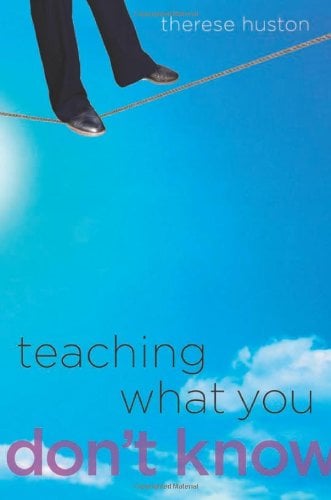You have /5 articles left.
Sign up for a free account or log in.
Natascha Chtena is a PhD student in Information Studies at the University of California, Los Angeles. You can follow her on Twitter @nataschachtena.

With the start of the fall term, many graduate students are entering the classroom as teaching assistants for the first time. While new TAs usually get a day or two of training from their universities, most of us discover pretty quickly that we need more guidance than that as we learn to lead a class or discussion section. Your school might have a center for teaching and learning or similar resource center, and you can also discuss teaching skills with more senior TAs or the professors in your department. But there are also plenty of books out there that can help, too, six of which I picked out for you below.
As I discovered, there are—more or less—two types of books on teaching. Those that tell you step-by-step what to do, and those that encourage you to think about what you’re doing and why. This list features more of the latter—at the end of the day, I have found much more inspiration, food for thought, and practical advice in the titles listed here than in your typical “survival kit” about college teaching.
If you are looking for an introduction to college teaching or a step-by-step analysis of how to teach, then other teaching resources will better suit your needs (for starters, check out First Day to Final Grade: A Graduate Student's Guide to Teaching, On Course: A Week-by-Week Guide to Your First Semester of College Teaching, or The Online Teaching Survival Guide: Simple Practical and Pedagogical Tips). I should also mention that the list was compiled from a humanities/social science perspective and might not appeal much to lab instructors, for instance (I’d love to hear from you folks in the comments section).
You may find some of the titles below a little … unorthodox, and you’re probably right. Yet each of these books has shaped my teaching in some substantive and practical way: the way I prepare for lessons, the nature of my homework, how I test for comprehension, the way I communicate with students, the feedback I give them. Whether you’re an anxious newbie or a seasoned instructor eager to improve, I hope you’ll find some inspiration in the pile:
- How To Talk About Books You Haven’t Read – P. Bayard: Far from a permission to dismiss reading, this book is an honest appraisal of what it means to be a “cultured individual” and, by extension, someone well-positioned to function as a teacher. It’s also a tremendously comforting read for anyone who’s ever been forced to express their opinion on a book they haven’t read. Bayard argues that far more important than having deep knowledge of a book’s content is the ability to situate it in relation to other books in our “collective library.” More provocative is his assertion that you don’t have to be familiar with something to talk about it accurately. I’d highly recommend this one to anyone leading a discussion section—your perception of what it means to read, discuss, and lecture might be altered forever.
- Classroom Assessment Techniques: A Handbook for College Teachers – T. A. Angelo: TA workshops and prep seminars tend to underemphasize assessment and evaluation techniques. I was lucky to be handed a copy of this handbook by a generous mentor and I recommend it wholeheartedly. If you’re looking for a handbook on grading, look elsewhere. But if you are looking for a variety of techniques to gauge student interest, prior knowledge, attitudes towards specific activities, or to confirm learning, this is the book for you.
- Are You Really Listening? Keys To Successful Communication – P.J. Donoghue & M. E. Siegel: Listening can tremendously improve the quality of communication with our students and yet, it’s not taught and most of us are really, really bad at it. I used to think of myself as a “good listener,” but reading Donoghue and Siegel’s book made me wonder whether I am only good at listening to the people I like. As a teacher, no matter how much you love your job, you can’t like all your students all the time. And you won’t necessarily always like what they’re saying, either. This book examines the different levels of “listening” and includes concrete, helpful advice on how to build one’s listening skills.
- Discussion As A Way of Teaching – S. D. Brookfield (with S. Preskill): The students who talk too much, the students who won't ever talk, and the students who keep hijacking the conversation—we all have to deal with them at some point or another. Here, Brookfield offers a broad spectrum of strategies that can be used to promote insightful, prolonged dialogue, covering everything from ground rules to questioning techniques and dealing with the unexpected. Another great book (and a classic) from the same author is The Skillful Teacher: On Technique, Trust and Responsiveness in the Classroom.
- Teaching What You Don’t Know – T. Huston. This book gave me a tremendous boost of confidence when I was TAing for a course whose subject matter I really didn’t know that well (but was very passionate about). It helped me get my impostor syndrome under control and reassured me that not having all the answers is OK, really. Although not a teaching manual per se, it does include plenty of advice and strategies on how to “teach what you don’t know”: how to earn students’ respect and look credible, how to prepare material, how to handle questions you don’t know the answers to, and how to use your time efficiently. Having said that, Huston’s book is illuminating even for those teaching within their expertise.
What are some books that have changed your teaching? Have I missed your favorite? Let us know in the comments below!




